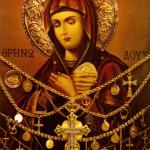Let us begin with the first two lines. What I see here is chiefly a reminder of our place vis-à-vis God, Who is infinitely above us and yet dearly among us, wholly other to all created things, and yet their origin who has implanted His image upon us. He is in heaven and His name is holy, to be respected, to be loved. We are to worship Him for Who He is, the Lord above; when we try to name Him, we fail, given that He transcends all names, and yet, any quality attributed to Him, not least the name He gave to Moses, must be given due honor.
And yet how do these lines begin? He is our father, that is, His transcendence of us cannot be removed from the fact that He loves us—He created us, sustains us, and rejuvenates us. What then can one ask from such a paradox?
We are to call for His kingdom and do His will. This is key; the way we close the gap noted above, the way we return to Him whence we come, is grounded not only in honoring Him, but in serving Him. We must make space in our own hearts to let Him in, to become open such that He, the king of all, may enter.
Further, these lines remind us of the perfection to which we are called; they say that we must act and pray such that the earth and Heaven are both completed through the doing of God’s will. This is, of course, the Eschaton, but it is also today, when we are to pick up our crosses and follow Him.
The remainder can be read as a series of petitions, if one wishes. But, to my eyes, it is, if this, much more. Our daily bread is both material and spiritual, the food of sustenance, of justice, a reminder that we, in doing His will, must not forget the needs of the body. At the same time, it is the Eucharist and God Himself as He enters into us in prayer, transforming our lives. This is, in effect, a call to humility such that God’s will may be done. It refers back to the beginning—in honoring and respecting Him as God and creator, we desire to do His will, and thus recognize our lowliness, our dependence upon Him, in body and in spirit.
The section on forgiveness is not much different. Here we see a further reminder that if we are to be forgiven, we must forgive. We must do the will of God to please Him; we must be willing to lower ourselves, to grovel, to beg, to smash our fists into our chests in sorrow, if we are to gain what the last two lines promise.
And here is one final reminder of our dependence upon Him. We ask not to be led into temptation; we ask for His saving light in the moments when we feel Satan breathe down our necks. For it is only in Him and in love of Him, not by our own distorted wills, that temptation may be avoided, that salvation may come.
Thus we come to the end: deliverance from evil—salvation.
In this sense, the prayer is the full prescription for the Christian life; it moves us through recognition of God’s glorious love (His having created us, His having majestic lordship over, and tender love for, us), to the humility this entails, to the acceptance of His ways that comes from humility, to full dependence on Him, to salvation.
How glorious a prayer it is, a safe haven against all manner of anxieties and pains! Yet, as I know only too well, we often rush right through it, not thinking of the great lessons contained within its few, short lines.
Kyrie Eleison.













